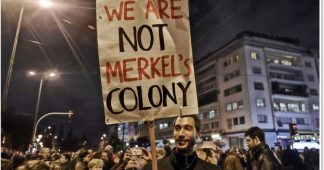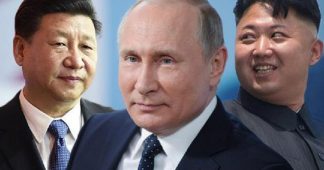The following article was written in 2013, still we believe that some of the main ideas underlying it remain even more relevant today, given the strong likelihood of a serious economic crisis
ΔΚ
By Dimitris Konstantakopoulos (*)
Two decades after the fall of the Berlin wall and the demise of the Soviet Union and soviet communism, in 1989-1991 and one decade after the blow to the Twin Towers in Manhattan (2001) which permitted the enormous military campaign of the “Empire” that followed in the Middle East, a “third wave”, of profound political, economic, geopolitical and “ideological” transformation of our world is hitting, this time, Europe. Simce 1989, a gigantic “counterrevolution” takes place against the remnants of “soviet communism” first, of the regimes born out of national, anticolonial struggles (especially in the Middle East) and now against European bourgeois and parliamentary democracy, as we know it after the 2nd world war and against european nation-states (the only basis on which a kind of democracy and social state is applied)
In all these waves of transformations, the real “historic subject” taking the initiative, more often behind than on the scene, remains one and the same. It is the most radical force of international capital, as expressed by neoconservatives. It is an alliance of the most radical forces inside the military-industrial complex of the USA and the “Empire of Finance”, an Empire ruling, in a quite concentrated way, world economy. We could name this alliance a union of American arms and big Banks.
Other subjects were sometimes active like the reformist wing of the CPSU in the case of the soviet demise or the German leadership which played a critical role in the European crisis (albeit in close alliance with the “Markets”, that is the Empire of Finance). But both were “second class” subjects, with strategic thinking of an inferior quality and scope than the thinking of the real radicals, neoliberals and neoconservatives. You have to go to people like Soros or Goldman Sachs or the lobby for a new American century to find the creators of the ideas and the initiators of the processes that shaped a perestroika turning quickly into catastroika, or of the permanent wars and the chaos in the Middle East or of the attack to the European nation-states and the remaining democratic characteristics of European integration after 2010.
If this world “counterrevolution” goes to the end it will lead us to a world totalitarian Empire, a kind of planetary dictatorship, denying not only the results of the 2nd world war, but also the ideas and results of the European revolutions of the last three centuries and of the national revolutions of the colonies. Such an Empire will impose, against the values and ideas of those revolutions, the “values” of Money. The project is to manage our very evolution as a species through a monopoly of scientific knowledge and technologic capacity, through the radical increase of inequalities, including inequalities in intellectual capacity and also through the use of new technologies, like information science, neuroscience, chaos theory, genetic engineering etc., in order to manipulate big societies and their representatives and “leaders”.
A fundamental characteristic of all three waves of transformations (ex USSR , Middle East, Western Europe ) is their catastrophic essence. The new orders created are nothing but the chaotic decomposition of older orders, be them “Soviet socialist”, “Arab nationalistic”, “Bourgeois democratic”, not the building of new ones. Take for instance Yugoslavia , which served also as a prototype for what was going to happen in the Middle East , according to Margaret Thatcher herself. All its republics have been destroyed and remain such, not only Serbia . The West has gone to war, supposedly to defend the rights of Bosnians or Kosovars, but it refused even the tiny means that would permit to Bosnians and Kosovars to survive in a decent way and reconstruct their countries. It was the opposite of what happened after the 2nd World War and through the Cold War, when Americans tried to build their system of liberal capitalism in Western, and Russians a system of “socialist” economy and society in Eastern Europe, both trying to increase after all the individualistic or the collectivistic prosperity of their subjects, not destroying everything as it is happening now with military means in the Middle East, with economic means in Europe.
From Lehman Brothers to Greece
A year after the collapse of Lehman Brothers, in 2008, the crisis of the US banking system “emigrated” in Europe, transforming itself into a sovereign debt crisis, but also inducing the more serious crisis in the history of the European Union itself – and of democracy in Europe after 1945. The very existence of the European Union and of the euro was put in doubt – or, at least, the question of who deserves to be a member of it. Even the very notions of State and Nation, of fundamental importance for Europe for three to five centuries, begun, in the process, to be shaken by the sovereign debt crisis, for the first time since the ‘30’s.
The 2008 banking crisis was addressed mainly by mobilizing very important state assets to save the banks, in both USA and Europe . “The banks are too big to fail”, politicians proclaimed in both Europe and America . By rewriting the fundamental laws of capitalism (firms or individuals which do not have to pay go bankrupt) Western political elite confirmed the domination of the whole system by the Finance, in a way not seen in the history of modern capitalism, at least after 1929 and signaled the advent of a system of financial feudality. Denying to the Banks the possibility to fail, western political elites pushed everybody else to fail, including states and whole societies!
It goes without saying that, in such conditions, there was not any serious chance to adopt the measures to control and curtail the activities of the financial sector, promised by western political elites. Political and media elites were strictly controlled by Finance, so it was only natural that Finance was able to avoid any losses because of the crisis and also to inflict its losses on the states, helping to transform the banking crisis into sovereign debt crisis. In the whole process, the financial sector has continued making nice gains.
A number of other factors also contributed to the sovereign debt crisis, including the pressure of globalization on Europe, the structure of the European Union and, in particular, of the Eurozone, the endemic mismanagement in some European countries (but which was not completely unrelated to the international environment) etc.
A (public and private) debt bubble was created and then exploded. This was not done in a spontaneous, but in a rather controlled way, reminiscent of the “technology” and the know-how created and used in this sphere by Goldman Sachs. (For this bank and the “Empire of Finance” look to Appendix 1). It was an alliance of the forces of World Finance and of the upper classes and the political establishment of Germany, followed by the biggest part of the European political and economic establishment that organized and fulfilled this operation. It was a Faustian alliance between Mrs. Merkel and interntional finance, followed by the other representatives of Money. In that aspect it may also be considered as an act of treason by German leaders towards the European idea, the centers and the soul of the world Finance being in fact outside continental Europe, in New York and the City, even if the financial institutions are often called Deutsche Bank or Société Générale.
The immediate aim of the operation was for the debt, created by the abusive, often fraudulent activity of the financial sector and the other factors mentioned above, to be repaid by the poorer strata and the poorer countries of EU/Eurozone. But, in fact, the crisis was also used in order to achieve much larger aims, of a fundamental, systemic importance, the debt being transformed into a powerful weapon to destroy in a very radical way the social, welfare state of Europe and also to press strongly European political system towards an oligarchic direction. The institutions created for the management of the debt begun to supersede over the “usual” democratic institutions, thus reflecting the beginning of the transition from the principle of “popular sovereignty”, fundamental, at least in theory, for post-Renaissance and post-Enlightenment Europe, towards a system founded on the principle of the domination of Finance. This tendency was already very clear in the Maastricht Treaty, that introduced the Euro. By the permanent anti-inflation mandate to the ECB, the no bail out clause, the “independence” of the ECB (its dependence on finance) and many other measures, the Maastricht Treaty has already established the domination of Finance over Europe, without saying it. But the Treaty did not create the tools of its enforcement. Those tools are now created in Europe as institutions to handle the debt and excessive budgets problem, like troikas, bail-out and bail-in programs, EFSF, ESM.
Another central question which is tried to be solved throught the management of the debt problem is the abolition of the European social welfare state. European politicians had tried often in the past to curtail it. Their successes have been peanuts if we compare them with was achieved in the last three years, when they were abolished or curtailed in some European countries, and first of all in Greece, the most fundamental rights workers and citizens of the continent had won after the 2nd world war – sometimes even since the beginning of the 20th century.
In this way Greece, followed gradually by the other countries of European periphery begun in 2010 their transformation into a kind of European Third World. The IMF was invited to help guide the procedure, as it has previously done in many third world countries. In the process democracy, state sovereignty and the relative independence of European states was curtailed. The equity between members of the Union and the eurozone itself, enshrined in the fundamental texts and Treaties of the EU was all but abolished, Germany using all its economic and political might to “discipline” Europe with the help of the markets. The very ideology of freedom and progress, on which Europe and European Union were based, was shattered. The same happened with the ideology of democracy, rating agencies, markets and troikas beginning to decide instead of elected parliaments and peoples.
A financial “Guderian” in Europe
From the point of view of the most radical forces of capital, the evolution of the European crisis during the last three to four years can be considered as an astonishing success, if we judge it by the facility of imposing their views into states and peoples around Europe . This success was prepared during the decades that preceded by the long decay of both socialdemocratic left and “national” right, of Gaullist or Christian-democratic type, in Europe, and the successful “entryism” of people of Finance and the “Empire” people in all important positions of European political, economic and media institutions. In the same time globalization, has created formidable difficulties for any political or state power that wants not to prevail over “markets”, but even to safeguard a small part of freedom of maneuvering.
In such conditions, “market” forces had the possibility to orchestrate the simultaneous use of information handling, influence over political decisions and capital movements on a large scale, producing the information-financial equivalent of war agains particular states in Europe beginning with Greece in 2009-10. Greece was in particular used simultaneously as a paradigm, a scapegoat, an experimentation field and also as a “scarecrow”, an example of punishment, destined to terrorize everybody else in Europe . Immediately after Greece had succumbed to the pressures of the markets and Germany , in April-May 2010, literally the next day, the market “war” proceeded immediately with other European peripheral countries, the last victim being Cyprus , in March 2013. This “war plan” reminds us of the Hitler campaign in Europe in 1939-41 or of the Middle East military campaigns after 2001 (against Afghanistan , Iraq , Lebanon , Libya , Syria , once in a time), organized in such a way as to avoid the union of the countries targeted.
The European debt wars were structured in such a way as to produce different classes of victims, making very difficult for them to unite. Greece , Cyprus and Portugal were transformed from relatively sovereign, independent states into complete, de jure “debt colonies”, governed nearly officially by troikas of lenders. But Portugal remains a relatively stable colony, while Greece and Cyprus are well inside a “death spiral”, to use Soros terminology, i.e. in a situation of rapid economic and social demise. In the case of Cyprus the very existence of this state is in doubt even in the short run. Other countries, like Italy and Spain are also becoming or have become, de facto, but not de yure, debt colonies.
As we will try to show the European debt crisis, which, in reality, is only at its beginning, is already producing not only serious shifts in economic and social policy in Europe, but also fundamental changes in the state structure of the continent, in the character of the Union, in its ideology, in the way European peoples look to themselves, even in the geopolitical situation, sometimes having even “civilization implications”. We are just in the beginning of a very deep, structural crisis in Europe , a crisis with a potential of transforming in a radical way the continent (and its role in the world). It cannot lead to anything less than a radical transformation, one way or another, of EU. In the most radical scenario it can provoke even the dissolution/destruction of EU and financial, “debt” wars inside Europe .
Processes like the ones we described, will influence heavily on the world’s “strategic” situation. The region of Eastern Mediterranean, where the world of Mars meets the world of Venus and where the domain of geopolitical revisionism (Middle East) partly overlaps with the domain of market revisionism ( Europe ), will be the first to be geopolitically affected. The region of Eastern Mediterranean is a cornerstone between Middle East and Western Europe , Russia and the “warm seas” and will be probably the first to be affected, also in a geopolitical way, from the European economic crisis.
The fact that the two EU countries belonging to this region, Greece and Cyprus, suffer a much deeper recession than any other European country, it is also a serious indication to this direction. We should also remember that Cyprus is facing a direct, immediate geopolitical threat to its very existence as a state. (Look to Appendix 2 for the geopolitical and “ideological” role and significance of Greece and Cyprus ). But the opposite is also true. Greece and Cyprus are serving now as a catalyst of much broader processes. They are, as we already noticed, at the same time, experimentation fields, scapegoats, catalysts and scarecrows.
Read more at http://www.konstantakopoulos.gr/198/debt-wars-and-the-fate-of-europe











